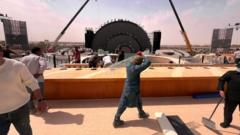Human rights organizations warn of a significant rise in fatalities among migrant construction workers in Saudi Arabia, citing systemic issues and a lack of proper compensation for families, as the country gears up to host the World Cup in 2034.
Human Rights Groups Raise Alarm on Rising Migrant Worker Deaths Ahead of 2034 World Cup

Human Rights Groups Raise Alarm on Rising Migrant Worker Deaths Ahead of 2034 World Cup
Reports indicate a troubling increase in workplace fatalities among migrant workers in Saudi Arabia as the nation prepares for the upcoming World Cup.
Human rights advocates are sounding the alarm over a disturbing rise in deaths among migrant construction workers in Saudi Arabia, coinciding with preparations for the 2034 World Cup. Reports from Human Rights Watch and FairSquare detail avoidable fatalities occurring at work sites, where many workers suffer tragic accidents that are often misclassified as natural causes, leaving their families without compensation.
The 2034 World Cup is poised to be the largest and most expensive in history, necessitating the construction of 11 new stadiums, an extensive rail and transit system, and 185,000 hotel rooms, which places millions of migrant workers at risk. Minky Worden, Director of Global Initiatives at Human Rights Watch, highlighted the potential human cost of these infrastructure projects, urging Saudi authorities to implement basic safety measures to protect its workforce.
These grave warnings come shortly after FIFA President Gianni Infantino's visit to Saudi Arabia, where he attended a high-profile investment forum alongside former U.S. President Donald Trump. FIFA claims a commitment to upholding human rights but has faced criticism from Human Rights Watch for not heeding lessons learned following a similar migrant worker situation during the lead-up to the 2022 World Cup in Qatar.
Gathering accurate data remains a challenge in Saudi Arabia due to limited access for human rights organizations and a ban on labor unions. However, Human Rights Watch conducted interviews revealing horrifying accounts from families of workers from Bangladesh, India, and Nepal who faced fatal workplace accidents. As construction intensifies, soaring temperatures present additional dangers for these laborers.
The first recorded death related to World Cup construction occurred this March when a Pakistani foreman fell from a stadium in Al Khobar. Despite claims from the Saudi government of substantial progress in occupational safety and FIFA's note of legal reforms since 2018, the global construction workers' union, BWI, reported a troubling rise in preventable incidents. The BWI General Secretary pointed to a culture of negligence and weak oversight as root causes.
Further complicating matters, FairSquare expressed concerns over the Saudi medical system's inadequacy in determining causes of migrant worker deaths, potentially leading to a lack of accountability. The organization's co-director criticized FIFA's human rights policies as insufficient, emphasizing the grim reality faced by families of deceased workers who may never learn the true circumstances of their loved ones' deaths.
Amid these challenges, FIFA announced plans for a workers' welfare system intended to establish mandatory standards for construction and service delivery. However, Human Rights Watch emphasized the need for clarity on how this system will function to ensure real protection for workers.
Advocates are calling on Saudi authorities, FIFA, and other employers to thoroughly investigate all migrant worker fatalities and provide families with timely and fair compensation, reiterating the urgency for reforms to safeguard workers' rights in the lead-up to the World Cup.




















